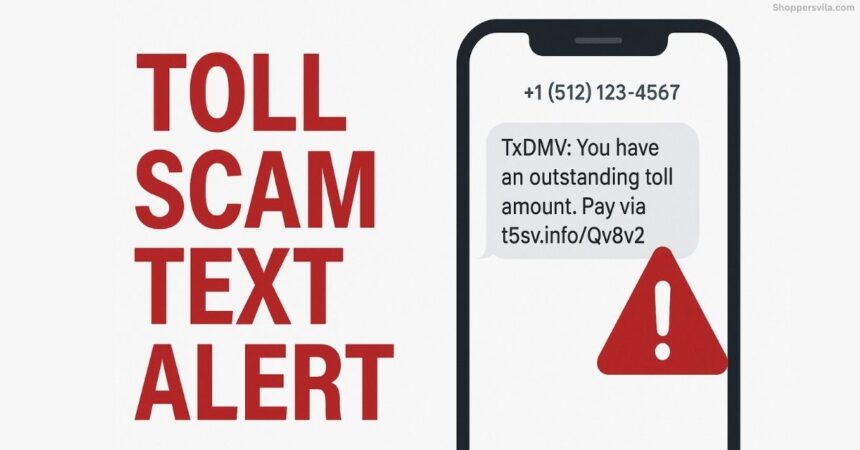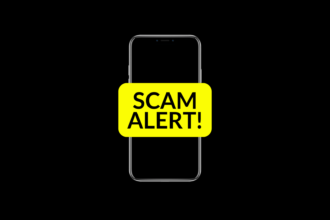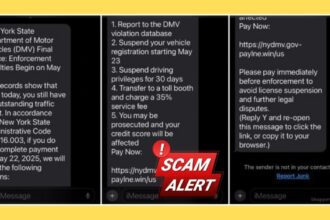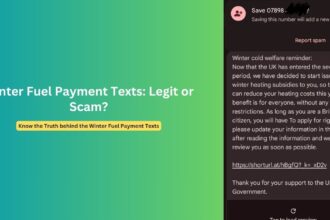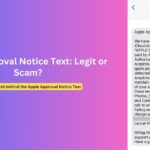Texas drivers are increasingly falling victim to sophisticated text message scams impersonating the Texas Department of Motor Vehicles (TxDMV). These fraudulent messages either threaten penalties for unpaid tolls and renewal fees or promise refunds for “good driving records,” all designed to steal personal and financial information. The TxDMV has issued explicit warnings about these deceptive communications, emphasizing that they “will never reach out directly via email or text requesting any personal information.”
This growing cybersecurity threat has become so widespread that the TxDMV has published specific examples of the fraudulent texts and detailed guidance for protecting yourself from these increasingly convincing scams.
Understanding the TxDMV Toll Payment Notification Scam
The TxDMV text message scam represents part of a nationwide trend targeting state motor vehicle and transportation agencies. Similar schemes have hit California’s Metro ExpressLanes, TxTag and FasTrak systems, suggesting an organized criminal operation that adapts its tactics to different states and agencies.
These phishing attempts have several key characteristics:
- Widespread targeting: Scammers send messages to random phone numbers within specific area codes, not just to people who have dealings with TxDMV
- Dual approaches: Some messages threaten penalties for unpaid fees, while others promise refunds or rewards
- Financial motivation: The scammers seek to steal credit card information, banking details, and personal data for identity theft
- False legitimacy: Messages often include official-sounding language and reference real TxDMV services
Importantly, the TxDMV has confirmed that no actual security breaches have occurred within their systems. These scammers are not working with insider information but rather casting a wide net in hopes of catching unsuspecting victims.
How the Scam Works
The scam follows a predictable pattern designed to exploit urgency, fear, or excitement:
For Penalty-Based Scams:
- Initial Contact: Victims receive a text message claiming to be from TxDMV stating they have “pending renewal fees” or an “outstanding toll”
- Creating Urgency: The message typically includes a deadline and threatens penalties like “legal action” if payment isn’t made immediately
- Providing a “Solution”: The text includes a shortened or disguised link to a fraudulent website designed to look like an official payment portal
- Data Theft: Once on the fake website, victims are prompted to enter personal and financial information, which scammers then use for identity theft or fraudulent charges
For Refund-Based Scams:
- Initial Contact: Victims receive a text claiming they “qualify for a refund” or can “claim money” from TxDMV
- Creating Excitement: The message mentions specific dollar amounts (often $550-$1,000) creating a sense of opportunity
- Providing a “Solution”: The text includes a shortened link to a fraudulent website where victims can supposedly claim their refund
- Data Theft: The fake website collects personal and financial information under the guise of processing the refund
Both approaches rely on emotional manipulation—either fear of consequences or excitement about unexpected money—to override caution and critical thinking.
Common TxDMV Fake Text Patterns and Examples
The TxDMV has published several examples of fraudulent messages that Texans have received. Recognizing these patterns can help you identify and avoid falling victim to similar scams.
Penalty/Fee-Based Messages:
TxDMV Notification, you have pending renewal fees. Please reach out to us10.com/pay
TxDMV.Notification: you have pending renewal fees Please contact tous 201d.com/R3MESPOTEN
TxDMV Final Reminder: You have an outstanding toll. Your toll account balance is outstanding. If you fail to pay by [specific date], you will be penalized or subject to legal action.
Refund/Reward-Based Messages:
Hi it’s Nick from The Motorvehicle Dept TxDMV. We just Issued a ruling that qualifies you to collect a Refund Payment: dy05x.com/Q9R1FctX6 Avg refund $1,000
[Name] you can claim $550 from TxDMV fora good record Confirm.details here buzt0l.com/LDUxgM9PK!
The scammers also send fraudulent emails, such as this example shared by TxDMV:
From: [email protected][email protected] To: [recipient] Sent: Friday, June 11, 2021, 07:49:08 AM MDT Subject: Validate Your Profle
Welcome to the Texas Department of Motor Vehicles (TXDMV) webDEALER | eTag System The webDEALER TAG system is designed to make processing dealer tags fast and easy for dealerships, please note that you are required to provide addtional information in order to continue to make use of the webDEALER | eTAG system.
To access your account, please click on the link below to validate your profile. Validate Your Profile
Note: If you need immediate assistance with a new or renewal license or have other immediate licensing issues, please send an email to [email protected]
Note the deliberate spelling errors (“Profle,” “addtional”) and the slightly incorrect email domain in the sender address (txdmy.org instead of txdmv.org).
Red Flags: How to Identify Fraudulent TxDMV Text Messages
Several telltale signs can help you distinguish between legitimate communications and scam attempts:
1. Suspicious URLs and Domains
- Short, obscure links (dy05x.com, buzto.com, us10.com)
- Domains that don’t match official TxDMV websites (txdmy.org vs. txdmv.org)
- URLs that use unusual extensions (.de, .top, etc.) rather than .gov or .org
2. Message Content Warning Signs
- Grammar and spelling errors (“fora good record” instead of “for a good record”)
- Unusually casual tone (“Hi it’s Nick from The Motorvehicle Dept”)
- Mention of “rulings” that qualify you for refunds (TxDMV doesn’t issue such rulings)
- Vague threats of “legal action” without specific details
- Extremely short payment deadlines
- Requests to respond with “Y” or other confirmations
3. Contact Information Red Flags
- Email addresses that don’t end in .gov (the official domain for government agencies)
- Phone numbers not matching official TxDMV contact numbers
- Unusual formatting of the sender’s information
4. Unusual Payment or Refund Methods
- Requests for payment through non-standard methods
- Offers of refunds without reference to specific services or fees you’ve paid
- Specific dollar amounts offered as refunds that seem arbitrary ($550, $1,000)
5. Communication Method
- The biggest red flag: TxDMV has explicitly stated they “will never reach out directly via email or text requesting any personal information”
Protecting Yourself from Unpaid Toll Payment Text Scams
If you receive a text message or email claiming to be from TxDMV, follow these steps to protect yourself:
If You Receive a Suspicious Text Message:
- DO NOT click on any links in the message
- DO NOT reply to the message
- Block the sender on your phone
- Delete the text message
- Report the text message to your cell carrier
If You Receive a Suspicious Email:
- DO NOT click on any links or open attachments
- Hover over links (without clicking) to see the actual URL destination
- DO NOT reply to the email
- Check the actual sender address carefully, not just the display name
For All Suspicious Communications:
- Contact TxDMV directly through official channels:
- Website: https://www.txdmv.gov/
- Email: [email protected]
- Phone: 1-888-368-4689
- Report the scam to appropriate authorities:
- Federal Trade Commission: https://reportfraud.ftc.gov/
- FBI Internet Crime Complaint Center: https://www.ic3.gov/
- Monitor your accounts for suspicious activity if you think you may have been exposed to the scam
- Verify any fees or refunds by logging into your TxDMV account directly through the official website, not through links in messages
If You’ve Already Responded to a Scam:
- Monitor your financial accounts closely for unauthorized transactions
- Consider placing a fraud alert on your credit reports
- Change passwords for any accounts that may be compromised
- Contact your bank or credit card company immediately if you provided financial information
- Report the incident to local law enforcement and file reports with the FTC and FBI
How Legitimate TxDMV Communications Work
Understanding how the real TxDMV communicates can help you spot fraudulent messages:
- Official notices about vehicle registration, titles, and other matters are typically sent through postal mail
- Electronic communications primarily occur through official portals you’ve registered for
- Payment requests include specific information about your vehicle and reference numbers
- Correspondence comes from official .gov domains and official phone numbers
- Refunds are processed through established channels, not offered randomly via text
- Verification is always possible through the official TxDMV website or phone line
The TxDMV emphasizes in their warning: “We cannot stress enough that TxDMV will never reach out directly via email or text requesting any personal information.”
Frequently Asked Questions
1. Is a TxDMV “Final Reminder” or “Unpaid Toll Notification” text legitimate?
No. The Texas Department of Motor Vehicles has explicitly stated they “will never reach out directly via email or text requesting any personal information.” Legitimate notices about fees, tolls, or registration matters are sent through postal mail or through official online accounts you’ve established.
2. What should I do if I already clicked on a link in a TxDMV scam text?
If you’ve already clicked a link, monitor your financial accounts closely for suspicious activity, change passwords for any accounts that may be compromised, and consider placing a fraud alert on your credit reports. Contact your bank immediately if you provided financial information, and report the incident to the FTC and FBI’s Internet Crime Complaint Center.
3. How can I verify if I actually owe fees to TxDMV?
Visit the official TxDMV website directly at https://www.txdmv.gov/ (never through links in emails or texts), call their official customer service line at 1-888-368-4689, or visit a local TxDMV office. For toll-related matters, check with the specific toll authority that manages the toll road in question.
4. Can the TxDMV suspend my license or vehicle registration based on a text message?
While failure to pay legitimate registration fees or tolls can eventually affect your vehicle registration after multiple official notices, the TxDMV does not initiate these processes via text message. Any text claiming immediate suspension powers is fraudulent. Legitimate enforcement actions involve formal notices through postal mail and multiple opportunities to address the issue.
5. Why am I receiving TxDMV refund texts when I don’t even live in Texas?
Scammers send messages to random phone numbers, not just to Texas residents or TxDMV customers. They hope that by casting a wide net, they’ll reach enough people who either have connections to Texas or who are uncertain enough to click through “just in case.” The promise of “free money” is designed to override skepticism and careful consideration.
Conclusion
The ongoing TxDMV text message scam represents a significant threat to Texans and even non-residents who may receive these fraudulent communications. By impersonating a trusted government agency, cybercriminals attempt to exploit people’s sense of responsibility (fear of unpaid obligations) or opportunism (desire for unexpected refunds).
The Texas Department of Motor Vehicles has been proactive in warning consumers about these scams, publishing examples of fraudulent messages and clear guidance on protecting yourself. Their unequivocal statement that they “will never reach out directly via email or text requesting any personal information” serves as the fundamental rule for identifying these scams.
As these phishing attempts grow more sophisticated and spread across different states and agencies, staying vigilant becomes increasingly important. Always verify communications through official channels, never click suspicious links, and report fraudulent messages to help authorities track and combat these cybercriminals.
Remember the TxDMV’s advice: “As always, be safe, be vigilant and exercise caution in your day-to-day communication needs via email or text.”
By understanding the tactics these scammers use and the red flags to watch for, you can protect yourself and help prevent others from falling victim to these increasingly prevalent scams.
Sources: Texas Department of Motor Vehicles (TxDMV), Federal Trade Commission (FTC), user reports
